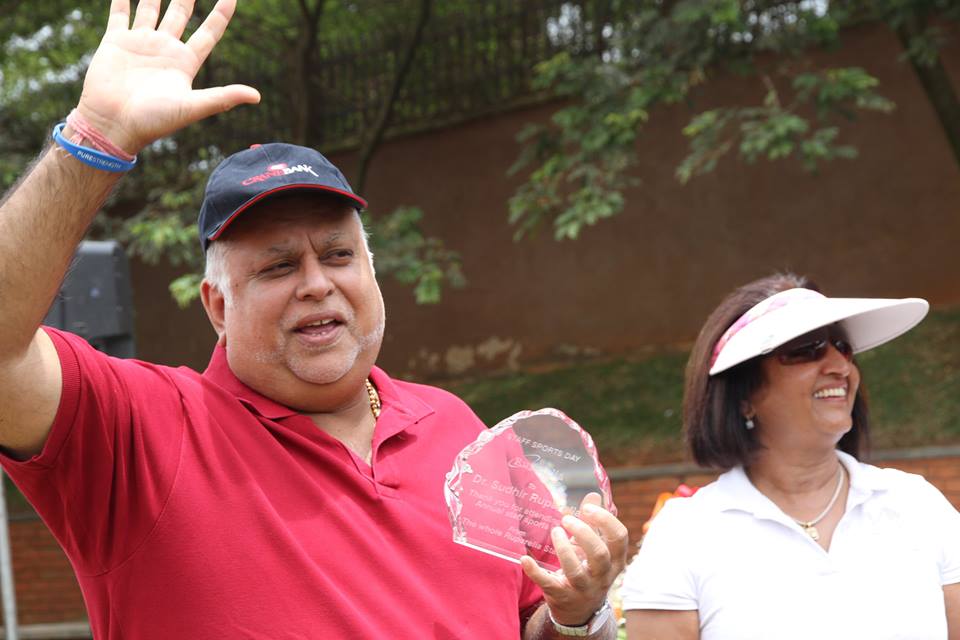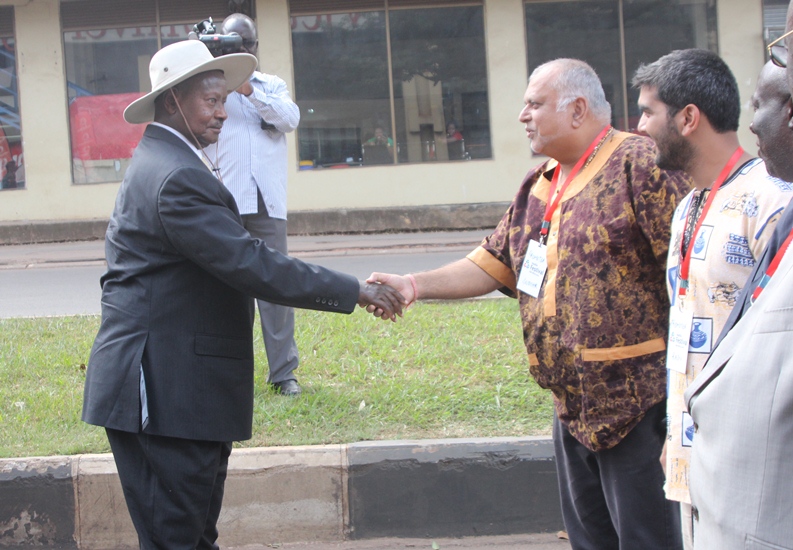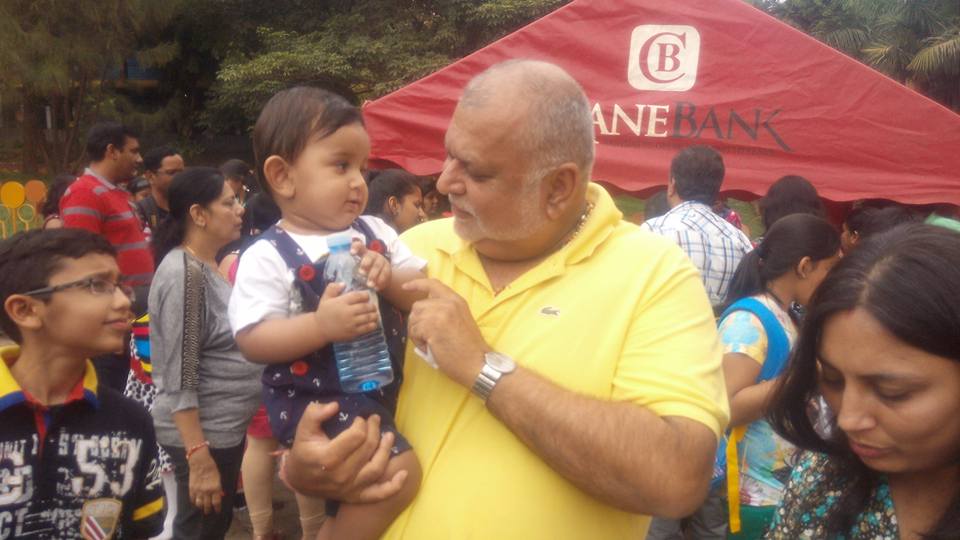He started his entrepreneurial journey when still a teenager, he dropped out of school to answer the entrepreneurial call, he sees opportunities where others don’t, he is a risk-taker, he is a portfolio entrepreneur, he is self-made, and his entrepreneurial prowess can’t be quenched. These are a few attributes that define Dr. Sudhir Ruparelia, a Ugandan of Asian origin, who remains East Africa’s greatest entrepreneur.
He is Sir Richard Branson, Britain’s “mad” entrepreneur, of sorts. The major difference could be that Branson is left-handed, dyslexic.
Sudhir started his entrepreneurial journey by importing beer and salt from Kenya and subsequently opened a foreign exchange bureau which laid the foundation for his entry into commercial banking.

When former Ugandan president, Idi Amin, gave Asians a 90-day ultimatum to get out of the country in August 1972, he sparked a desperate fight for life for more than 60,000 people. Some, who feared Amin’s brutality, had nowhere to run.
Their bodies were found in the waters of the Nile. Hitherto happy families fretted as they sought survival. Among them was a Ugandan Indian retailer’s family that took flight, leaving behind, in the midst of panic and confusion, a 16-year-old son.
This vulnerable teenager was Sudhir Ruparelia. More than 40 years on from this tearful parting, Sudhir is ranked by Forbes as the 22nd wealthiest person in Africa with an estimated net worth of $1.1 billion. His is a remarkable story of hard work and endurance.
“It was an awful moment for the Asian community. You couldn’t predict what was to happen to you the next day. But I convinced my parents to leave me behind on the promise that I would join them later,” Sudhir said.
Sudhir’s Ugandan-born parents had established a shop and gas station in the middle of Queen Elizabeth National Park in western Uganda. They ran it for years. The bravery and tenacity that helped Sudhir survive and prosper amidst chaos can be traced back to his childhood. Sudhir studied in schools that were far away from the wildlife park where his parents ran their business. This meant he travelled long distances alone.
He cadged lifts on trucks ferrying traders. The trucks would leave the bush loaded with fish and salt and return packed with merchandise. Although the East African railway service was booming at that time, Sudhir says it was only for the rich. At school, there was no communication with his parents until the holidays.
This forged a hard edge to Sudhir. All he wanted from his departing family was money to survive. His wish was granted. For six weeks, Sudhir ran riot with his friends.
“We had a lot of money to party and drink. The security personnel occasionally stopped us but we always sweet-talked them into releasing us,” he said.
His moment of truth came when intelligence men arrested one of his friends. They wanted to extort money.
“Once he was released, we all decided to leave since the city was also getting desolate. There were just about 100 Asians left,” said the property mogul.
Sudhir landed alone in London and didn’t even know where to find his parents. Together with other exiles, he was checked into a refugee camp. On the second day, he set out to find friends in Finchley Central. He found eight of them living in a two-roomed house. He never returned to the camp.
After five weeks in London, Sudhir found his family, but only to tell them that he wasn’t content with his refugee status and that he was moving on. He headed to Birmingham and Manchester where there were jobs that could promise permanency. Sudhir tried to get work at Ford Motor Company but was thwarted by a union closed shop.
He moved to Ilford, in northeast London, where he found a job with a company that made test tubes for laboratories. He handled red-hot wax in making centimetre markings on test tubes.
“This was the most sickening job in the entire factory. I barely had any protection and the heat was unbearable. No wonder I worked for only five months and moved back to Finchley Central,” says Sudhir.
Next, he tried to join the Royal Air Force (RAF). He passed the tests and was on the verge of signing for five years. The problem was he was a minor and needed the consent of his parents. His mother declined. Her idea of the military had been tainted by the cruelty she had witnessed by the Ugandan army. Sudhir’s father differed but the mother held sway.
The RAF offered education. Sudhir hoped for academic success, but it was not to be.
In February 1985, Sudhir returned to Uganda, aged 29, with $25,000 he had earned through real estate deals in London. Due to unrest, Uganda was hit by foreign exchange shortages that caused the decline of the Ugandan shilling to a low in 1985 of Shs 600 to $l. Sudhir says he kept a low profile for over a year to allow him time to study and understand the ruined economy.
In December 1986, Sudhir opened a wholesale store, in Kampala’s central business district, dealing in imported beer, salt and wine. The civil war left the breweries of Uganda in ruins. This made it lucrative to import beer, with household goods, from Kenya. Sudhir positioned himself as a channel between importers and retailers.
He became a trusted business partner to the importers, who supplied him the items on credit and claimed payments after a couple of days, to accelerate returns. He ran the system effectively and set up the first solid distribution structure in Kampala.
“While in London, the strongest trait I learnt was being disciplined. I ensured that the suppliers’ money was always readily available as agreed,” he says.
After just three months, he became the number one dealer in imported beer in Kampala. Armed with a sound supply chain, Sudhir wasted no time in elevating himself to importer. This required piles of foreign exchange. So, he started a currency exchange service, which was another untapped market in Uganda.
Though the sector operated informally, the demand was overwhelming. Sudhir earned $10,000 in profit every day. He invested part of this money in prime properties in Kampala. In 1990, the government moved in with a policy to regulate forex businesses, which had mushroomed. Sudhir’s Crane Forex bureau became the first to be licensed in the country.
This catapulted him beyond his wildest dreams. In just six months, Sudhir says, he was making more money than the commercial banks. He itched to grow his financial services empire and in 1995 created Crane bank with $1 million. Part of his frustration, was the way commercial banks operated as if they were doing everyone a favour. The charges were high and the choice limited. Sudhir came up with a motto for his new bank: Serving To Grow And Growing To Serve.
He lowered bank charges, extended banking hours; becoming the first to operate up to 5pm and on Saturdays. He also cut red tape. Today, Crane bank is worth $120 million in capital and has 38 branches across the country. Crane bank was voted Bank of the Year Uganda in 2009 and also won the Banker of the Year award in 2003, 2005, 2006, 2007 and 2008 by the Financial Times in London, where Sudhir’s working life began.
In 2011, the bank posted a 32.3 increment in profit before tax, rising to UGX.90.23 billion ($37 million) from UGX. 68.19 billion ($28 million) in 2010.
“We are currently about 35 million people in Uganda. Only three and a half million live in Kampala. The rest of the population is in the countryside. That has guided our philosophy of opening more branches upcountry,” says Sudhir.
His plan is to open 10 branches a year for the next three to four years, with the hope of expanding into Rwanda this year, followed by South Sudan. In his office, Sudhir’s wide collection of awards is impressive. He has won most of the top investment awards in Uganda, including the Presidential Export award for 2002, 2006, 2005 and 2009. He also received an honorary Doctorate of Law in Business from the Uganda Pentecostal University for his investments in the Ugandan economy.
Through his floriculture company, Rosebud Ltd, Sudhir has been exporting 13 million roses to Europe a month, earning him a profit of $5 million per year. Production is set to increase once he acquires a planned 200 additional hectares. He will effectively produce one and a half million stems a day, creating 7,000 jobs and projected returns worth $95 to 100 million per year.
Through his estate holding company, Meera Investments Sudhir owns at least 300 residential and commercial properties in Uganda, from Crane Chambers in the central business district, to scores of apartment blocks, shopping centres, office buildings and tracts of valuable land. He estimates his rent is around $600 million a year from his real estate.
His five-star Speke Resort and Conference Centre, situated on 75 acres, by the shores of Lake Victoria near Kampala, played host to the 2007 Commonwealth Heads of Government Meeting, which drew 59 leaders. Built for the Commonwealth meeting, the resort has 780 rooms, 10 conference rooms, a 1,000-seat ballroom and nine meeting rooms that can accommodate groups ranging from 10 to 300 people. It also has Uganda’s only Olympic-size swimming pool, an equestrian centre and a host of bars and restaurants.
The plush hotel, worth around $165 million, caught the eye of the late Libyan president, Muammar Gaddafi, who tried to buy it for $120 million. Sudhir turned him down. His other assets include Speke hotel, Kabira Country club and Speke apartments, all high-end facilities in prime zones of Kampala and worth millions of dollars.
Sudhir also bought Victoria University from Edulink Holdings Ltd to add to his educational institutions portfolio already comprising of Kampala International School Uganda (KISU) and Kampala Parents’ School. The institutions are worth more than $40 million.

Asked what guides his investment, Sudhir says it is instinctive risk taking rather than feasibility studies.
“In Africa, feasibility studies are a waste of time. It’s about ability to see opportunity and take it up. If you did feasibility studies for a country like Uganda, you would never do anything,” he said.
Via Vencha Magazine








